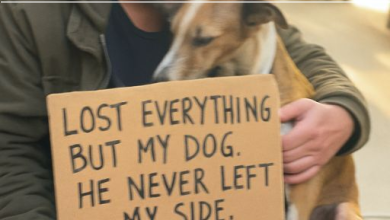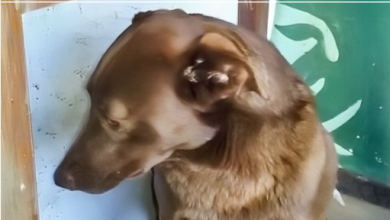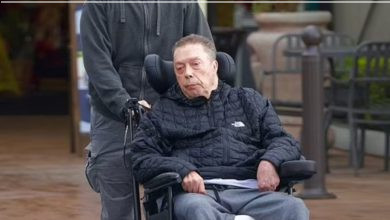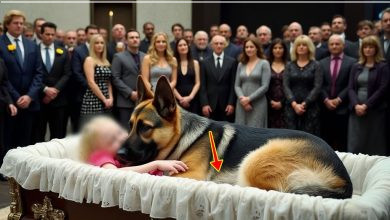Before he picked up that one chicken, everything was OK.
At first, it was just a sweet little moment.
My young cousin Eli was crouched down in the yard, laughing as the chickens wandered around his feet. He gently picked up the fluffy white one we call Marbles and hugged her like a beloved toy. I was taking pictures, already thinking about the perfect caption for Instagram.
But then, suddenly, the other chickens stopped moving.
Completely frozen—three roosters halted mid-step, all tilting their heads in unison, staring at Eli and Marbles like something was terribly wrong.
I chuckled nervously, but Eli didn’t seem to notice. He just kept cradling Marbles, rocking her softly.
That’s when I noticed something strange.
Boss—the rooster who’s usually loud and aggressive—backed away slowly. Not from Eli, but toward the shed. And the others followed him.
It wasn’t like normal chicken behavior.
It felt like they were waiting for something.
I started to tell Eli to put Marbles down, but he looked up at me, confused.
“She won’t let go,” he said.
“What do you mean?” I asked.
Then I saw his arms.
There were small white scratches forming—three of them, almost like letters. I leaned in closer and realized they were spelling something out.
The first letter was a D.
The second was an O.
And the third… was an N.
“Don.”
I blinked. “Don? Who’s Don?”
Eli’s eyes were wide and glassy. “I don’t know,” he whispered. “But I think she does.”
I looked down at Marbles still resting in his arms. Her eyes were open, but it felt like she wasn’t really seeing us—more like looking through us. Her feathers, usually soft, had started to bristle like static electricity.
Behind me, I heard the shed door creak open.
Boss had reached it and was pecking at the wood in a steady rhythm.
A chill ran down my spine.
“Okay,” I said cautiously, “we’re going inside. Now.”
Eli stood slowly, still holding Marbles, who hadn’t moved. The scratches on his arms had deepened, the marks like tiny blades writing an invisible message.
Now it spelled: DON’T.
“Don’t what?” I muttered.
“I think she’s scared,” Eli said quietly. “Of them.”
We hurried inside. The roosters stayed outside, watching silently.
Once inside, I locked the door, closed the curtains, and had Eli sit on the couch. He still clung to Marbles, and I wasn’t about to force him to let go. Something strange was happening—and whether it was some kind of supernatural event or just a weird coincidence, I wasn’t taking chances.
I called Nana, who had given us the chickens. She always said they were “special stock” from her mountain hometown. Back then, I just thought she meant they laid good eggs.
No answer.
I called again. Still nothing.
“Is Nana okay?” Eli asked softly.
“I’m sure she’s fine,” I said, hoping to calm him. “She’s probably in the garden.”
Eli nodded but kept staring at Marbles, then said something that made my skin crawl.
“She’s talking to me.”
I froze. “What do you mean?”
“Not with words,” he said. “With pictures. Like dreams, but I’m awake.”
“What do you see?”
He hesitated. “A man. In the shed. Buried.”
My heart sank.
Because three years ago, before we moved in, the property belonged to a man named Don Whitmer.
The same Don whose name was scratched into Eli’s skin.
I quickly looked it up. Don Whitmer was the previous owner, who disappeared one summer. They never found any evidence of foul play. The story was that he left a note about moving to Florida and was never heard from again.
No body was ever found.
I stared at Marbles, who remained still.
“You think…” I whispered, hesitant, “she’s trying to show us where he is?”
Eli nodded. “She showed me. Behind the shed, near the big oak tree roots.”
I swallowed hard.
I didn’t want to believe it, but something told me we had to check it out—not just out of curiosity, but because Marbles didn’t seem like an ordinary chicken.
I grabbed a shovel and told Eli to stay inside. He refused.
“She won’t let go,” he said, and her little claws were gripping his shirt tightly.
So, we went together.
When we stepped outside, the roosters were gone. Only the wind, the creaky shed, and the oak tree remained.
We went around back.
Eli pointed to a patch of disturbed soil, barely noticeable.
“This is it,” he said.
I began digging.
After a few inches, I hit something hard.
Metal.
An old rusty box, about the size of a toolbox. I pulled it out with trembling hands and opened it.
Inside were bones.
Not a full skeleton—just a jawbone, some ribs, and the top of a skull. There was also a worn leather wallet with an ID inside.
Donald Whitmer.
My heart raced. “We have to call the police.”
Eli nodded. “She said thank you.”
I looked down at Marbles. Her feathers had smoothed out, her eyes blinked normally, and then she fluttered down and walked away like nothing had happened.
I watched in disbelief.
That evening, the police came, cordoned off the yard, collected the bones, and questioned us. We told them we found something buried near the shed—leaving out the chicken’s role.
The news ran the story: Missing Man Found After Three Years, Foul Play Suspected.
They found evidence of a blow to the head. Murder.
No suspects. No arrests.
Two days later, Nana called.
“I heard about Don,” she said quietly. “Did the chickens show you?”
My blood ran cold. “You knew?”
“I didn’t know it was him,” she said. “But I knew the birds were guarding something.”
“Why didn’t you say anything?”
“Would you have believed me?” she asked gently.
I had no answer.
After that, things changed.
The roosters returned to normal. Boss crowed at dawn again. Marbles stayed distant, never letting anyone pick her up. And Eli seemed lighter, like a burden had lifted.
A month later, Eli said something that stayed with me:
“She didn’t want justice,” he said. “She just wanted to be heard.”
I asked who he meant—Marbles or Don.
He just shrugged. “Maybe both.”
I never looked at animals the same way again.
Sometimes, when I sit outside with my coffee, I see Marbles watching from across the yard—not in a creepy way, but quietly, like she’s making sure things are right.
And deep down, I think she is.
We never found out who killed Don. Maybe that wasn’t the point.
Maybe the point is that even in the quietest, most unexpected places—even in a chicken coop—truth has a way of coming out.
It scratches its way through feathers and years of silence, but it gets out.
And when it does, it sets something free.
Now, I listen more—to the wind, the animals, and the things left unspoken.
Sometimes, the smallest voices carry the biggest truths.
And sometimes, justice comes in the form of a chicken that won’t let go.
If you liked this story, share it with someone who believes even small acts—like picking up a strange chicken—can change everything. And if it gave you chills, don’t hesitate to like the post. You never know who might need to hear it.



